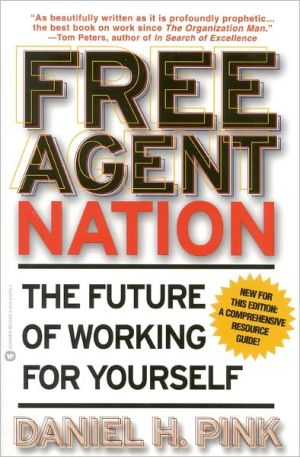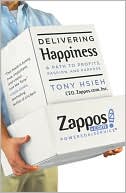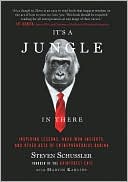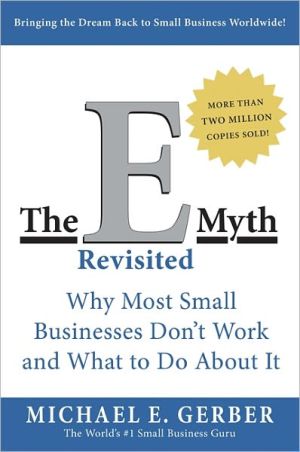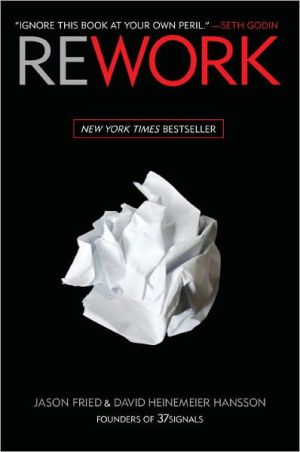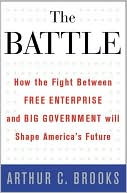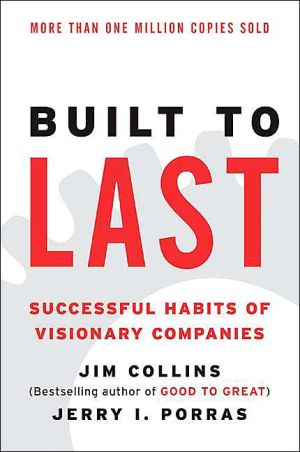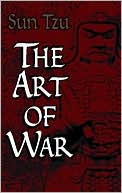Free Agent Nation: The Future of Working for Yourself
Widely acclaimed for its engaging style and provocative perspective, this book has helped thousands transform their working lives. Now the paperback edition features a comprehensive 30-page resource guide that explains the basics of working for oneself.\ \ In this landmark book, Daniel H. Pink offers the definitive account of this revolution in work. He shows who these free agents are -- from the marketing consultant down the street to the home-based "mompreneur" to...
Search in google:
Hip and hopeful, meticulously researched and joyously iconoclastic, Free Agent Nation will change your thinking--and maybe even change your life. Alan M. Webber A brilliant book. Pink defines...with the keen eye of a trained sociologist, the literary skill of a masterful prose stylist, and the irreverent wit of a stand-up comic...a must-read — an instant contemporary classic.
CHAPTER 1THE CRUX: In the second half of the twentieth century, the key to understanding America's social and economic life was the Organization Man. In the first half of the twenty—first century, the new emblematic figure is the free agent—the independent worker who operates on his or her own terms, untethered to a large organization, serving multiple clients and customers instead of a single boss. The rise of free agency shatters many ironclad premises about work, life, and business in America— from how companies should operate, to how we structure our health care, retirement, and education systems, to which values guide our lives. To truly understand the new economy, you must first understand the free agent.\ THE FACTOID: The largest private employer in the U.S. is not Detroit's General Motors or Ford, or even Seattle's Microsoft or Amazon.com, but Milwaukee's Manpower Inc., a temp agency.\ THE QUOTE: "This book is about the free agent. If the term is vague, it is because I can think of no other way to describe the people I am talking about. They are free from the bonds of a large institution, and agents of their own futures. They are the new archetypes of work in America."\ THE WORD:Tailorism. The free agent's approach to work; descendant of Taylorism, Frederick Winslow Taylor's One Best Way method of mass production. Under Tailorism, free agents fashion their work lives to suit their own needs and desires— instead of accepting the uniform values, rules, and structure of a traditional job. Opposite of the One Size Fits All ethic of the Organization Man era. (Synonym: My Size Fits Me).\ Copyright (c) 2001 by Daniel H. Pink
Prologue1Part 1Welcome to Free Agent NationChapter 1.Bye, Bye, Organization Guy9Chapter 2.How Many Are There? The Numbers and Nuances of Free Agency27Chapter 3.How Did It Happen? The Four Ingredients of Free Agency47Part 2The Free Agent WayChapter 4.The New Work Ethic59Chapter 5.The New Employment Contract85Chapter 6.The New Time Clock103Part 3How (and Why) Free Agency WorksChapter 7.Small Groups, Big Impact: Reinventing Togetherness in Free Agent Nation123Chapter 8.Getting Horizontal: The Free Agent Org Chart and Operating System143Chapter 9.The Free Agent Infrastructure161Chapter 10.Matchmakers, Agents, and Coaches171Chapter 11.Free Agent Families183Part 4Free Agent WoesChapter 12.Roadblocks on Free Agent Avenue: Health Insurance, Taxes, and Zoning199Chapter 13.Temp Slaves, Permatemps, and the Rise of Self-Organized Labor213Part 5The Free Agent FutureChapter 14.E-tirement: Free Agency and the New Old Age233Chapter 15.School's Out: Free Agency and the Future of Education243Chapter 16.Location, Location ... Vocation: Free Agency and the Future of Offices, Homes, and Real Estate261Chapter 17.Putting the "I" in IPO: The Path Toward Free Agent Finance271Chapter 18.A Chip Off the Old Voting Bloc: The New Politics of Free Agency287Chapter 19.What's Left: Free Agency and the Future of Commerce, Careers, and Community301Epilogue313The Official Free Agent Nation Resource Guide315Notes347AppendixResults of the Free Agent Nation Online Census369Acknowledgments375Index377
\ From Barnes & NobleAuthor Pink argues that athletes aren't the only Americans who are renouncing traditional team allegiances. Citing the country's 25 million self-employed workers, he predicts the incremental undermining of conventional corporate society. The job that your parents knew, he contends, is defunct. Pink believes that post-baby boomers subscribe to creating their own destinies, not to old company loyalties. Instead of looking to mega-corporations, he says, they think small, noting for example that since 1994, firms with fewer than 20 employees have created 80 percent of new jobs in our economy. An eloquent manifesto about a glacial shift.\ \ \ \ \ Alan M. WebberA brilliant book. Pink defines...with the keen eye of a trained sociologist, the literary skill of a masterful prose stylist, and the irreverent wit of a stand-up comic...a must-read — an instant contemporary classic.\ \ \ Naomi WolfA groundbreaking book ...for the new digitocracy, this book represents both a readable and persuasive benchmark.\ \ \ \ \ Paul OrfaleaFREE AGENT NATION ought to be on the reading list of anybody who runs a business... a smart book that is this fun or a fun book that is this smart... an original!\ \ \ \ \ Scott AdamsFree Agent Nation will turn your notion of a career upside down. It might even set you free. It's the defining book on the untethered workforce.\ \ \ \ \ Stephen M. CaseThe trend Dan Pink writes about so knowledgeably is already transforming the future of business. FREE AGENT NATION is the shape of things to come in the Internet Century.\ \ \ \ \ Library JournalNot all "free agents" are highly paid athletes whose main skills are dunking a basketball or hitting a baseball. In fact, as Pink (contributing editor, Fast Company) reveals, over 25 million Americans are now self-employed, and fewer than one in ten works for a Fortune 500 company. This excellent work synthesizes the seismic shift in attitudes about and patterns of work in the economy from the early 1950s era of William Whyte's The Organization Man to today's independent worker, the free agent. Pink astutely summarizes what this major shift in the definition of employment now means to millions of Americans and explains the various types of free agents (including soloists, temps, and those involved in their own microbusiness). Other chapters cover examples of how self-sufficiency works so well for numerous life situations, while in many cases free-agency employment does not work well at all. This work may not be rooted in empirical research, but Pink's thorough review of the literature and his extensive roadwork interviewing hundreds of independent workers successfully merges psychosocial data with pragmatic reality. This major contribution to better understanding the trend toward independent contract work is highly recommended for all university libraries and larger public libraries. Dale Farris, Groves, TX Copyright 2001 Cahners Business Information.\ \ \ \ \ Soundview Executive Book SummariesOver the past decade, in nearly every industry and region, legions of Americans are abandoning one of the Industrial Revolution's most enduring legacies -- the "job" -- to become free agents -- as self-employed knowledge workers, proprietors of home-based businesses, temps, freelancers or independent contractors. Daniel H. Pink spent a year traveling the country, talking with hundreds of these workers. The composite sketch Pink reveals in Free Agent Nation displays the political, economic and personal effects these individualists are having on all our institutions.\ Pink explains that the American working economy for several generations had a single, human emblem -- the "Organization Man," so dubbed after the 1956 book of the same name by William H. Whyte, Jr. The label described what was then the quintessence of work in America - an individual (nearly always male) who ignored or buried his own identity and goals in the service of a large organization, which rewarded his self-denial with a regular paycheck and job security. Organization Men abided by what Whyte named a Social Ethic, a secular theology that placed the organization at the center of the universe, and defined entrepreneurs as "selfish type[s], motivated by greed."\ Beginning in the 1980s, conditions and attitudes changed. Companies that had formed the bedrock of American work began winnowing their work forces in response to economic stimuli, corporate restructuring, and technology that could do people's work for less money. Pink writes that the social contract of job security was broken; the Organization Man was relegated to the annals of history. What replaced him as the archetype of work in America is the free agent - the independent worker who operates on his or her own terms, untethered to a large organization, serving multiple clients and customers instead of a single boss.\ Pink explains that free agency has already begun overturning many of today's central assumptions about American work and life, among them the following:\ \ Loyalty is dead. It's not dead; it's different. Instead of up-and-down loyalty that runs from individual to institution, free agents practice side-to-side loyalty - an allegiance to clients, colleagues, teams, projects and industries.\ The work force is adrift, operating without a broad social contract. The implicit employment promise that reigned in the days of the Organization Man has disappeared, replaced by a new one that trades talent for opportunity.\ The free-agent economy makes workers less secure. As free agents compile a diverse portfolio of clients, customers and projects, they often find themselves in a more secure position than traditional workers.\ Parents must try to balance work and family. Corporate and government efforts to be more "family-friendly" offer a one-size-fits-all approach to the work/family balance. Free agents tend to erase the boundaries between the two, blending, rather than balancing.\ "Empowerment" and "retention" are wise strategies for corporate managers. These concepts are built on the fact that organizations hold all the power. In a free-agent economy, organizations need individuals more than individuals need organizations, which can inspire and challenge people, but cannot "empower" or "retain" them.\ Rampant individualism is fraying our social fabric. Critics claim our common culture is corroding, and the free agent economy is speeding the problem. In actuality, it may be providing a solution, mending bonds and repairing our concepts of community.\ \ \ \ \ Through his experience and research, Pink has found that most free agents are at least approximations of one of three basic free agent species - soloists, temps and "microbusinesses."\ Pink writes that the most common variety of free agent is the soloist - someone who works for him- or herself, generally alone, moving from project to project, selling his or her services. Over the years, soloists were termed "freelancers" in the cultural vernacular; "independent contractors" in legal vernacular; and any one of a dozen or more terms for self-employed soloists.\ If soloists are free agents by design, Pink explains that temps are often free agents by default. Many of the 3.5 million workers in the temp population would rather have a "permanent" job with a company, but coldly efficient corporations, temp agencies looking after their own interests, and the temps' own lack of ambition or ability conspire to pin them to the bottom of the economic ladder.\ Erupting across the Free Agent Nation is a blaze of enterprises that are smaller than the typical "small business" - sometimes consisting of only two or three people. Pink explains that these microbusinesses are a growing force - more than half of American companies today have fewer than five employees.\ While many pundits bemoan the loss of a sense of community in the business world (and elsewhere), Pink writes that free agents are, as a result of and in response to their independence, finding ways to create their own communities, with their own infrastructure, and their own network of professionals whose business it is to make their lives and work easier. He writes that it is in part due to these things that the Free Agent Nation continues to grow, not just in numbers, but also in richness and depth of community.\ Why Soundview Likes This Book\ Free Agent Nation delves into a current trend that has transformed the way people think about work and working, and captures a fresh perspective on the transformational effects that entrepreneurship is having on the modern working world. Managers, business owners, and anyone thinking of becoming a free agent will want to understand this powerful new demographic and its impact on the business landscape. Copyright (c) 2002 Soundview Executive Book Summaries\ \ \
